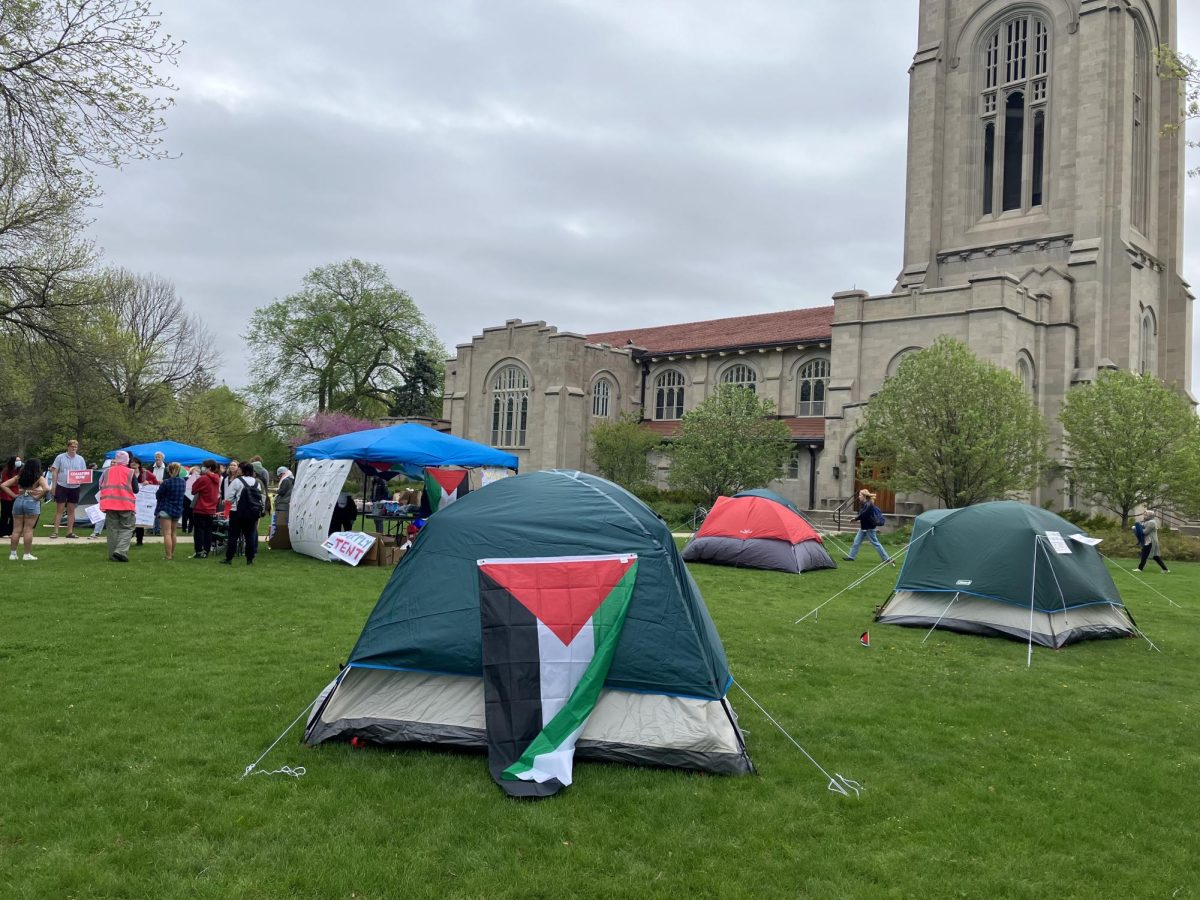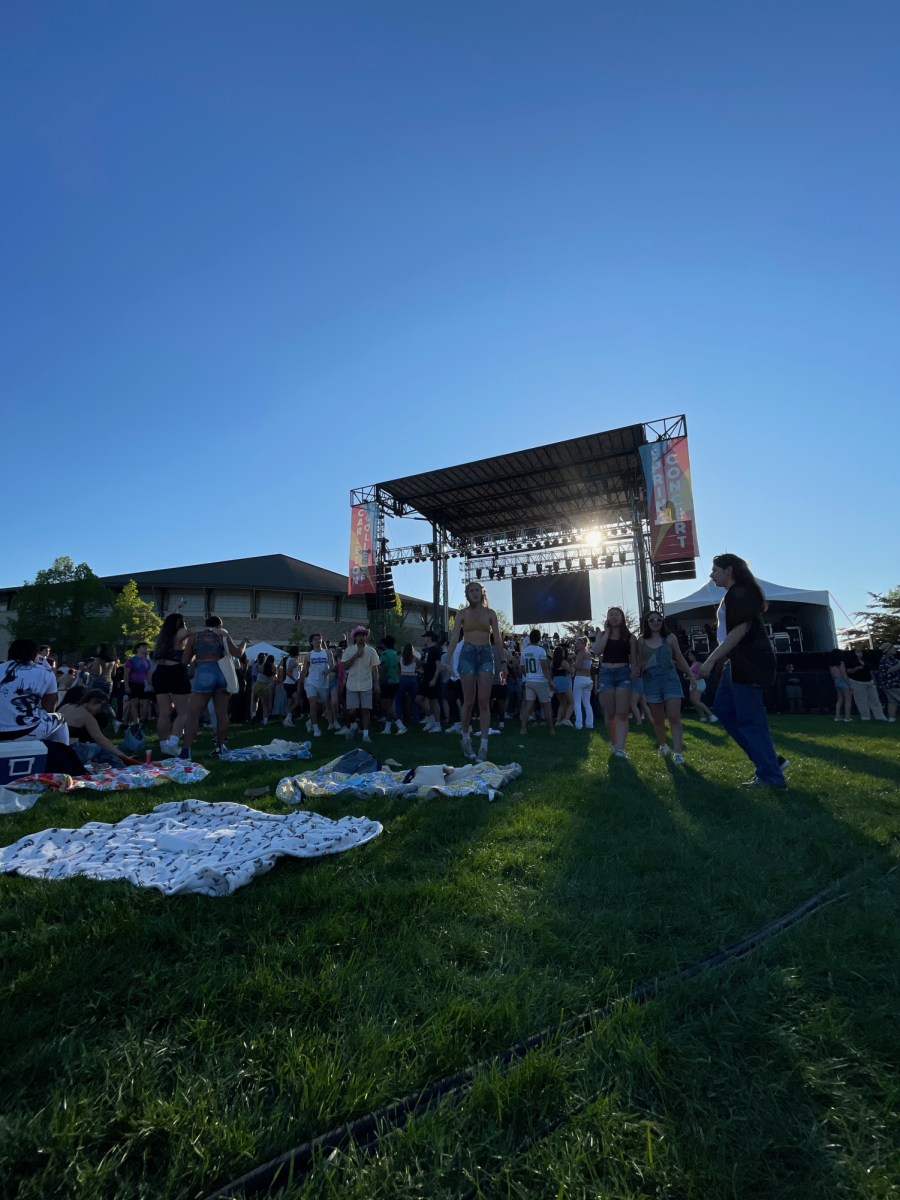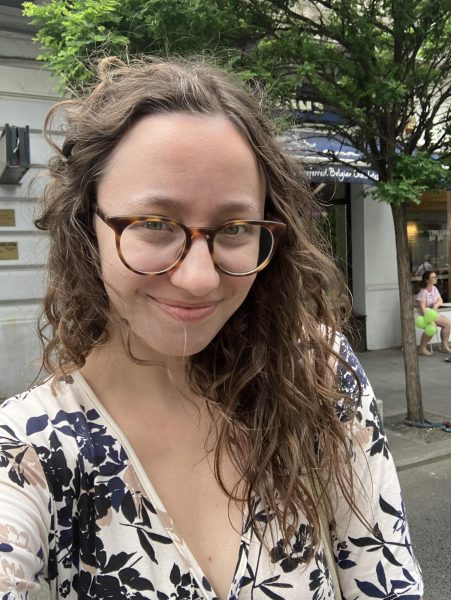Carleton students recently began an encampment in support of Palestine on the Chapel lawn during the college Board of Trustees’ scheduled May 8-10 visit. The 12-tent encampment, according to leaders of the college’s Students for Justice in Palestine (SJP) chapter who organized it, is expected to last either until Commencement, or until the board addresses SJP’s demands.
This escalation in protesting begins as national campus tensions over the devastating conflict in Gaza have reached a high. Student protests in support of Palestine are ongoing across the country even after more than 2,700 students have been arrested or detained since April 18, with many more having been suspended. Some schools have even moved to online classes as conditions worsen, while others lessened pressures by agreeing to address protestors’ demands, even after arresting them. Despite this, Carleton — and most other liberal arts colleges — have remained peaceful. College President Alison Byerly indicated that, unlike at some other schools, Carleton’s administration does not intend to interfere with the encampment.
Students woke up early on Thursday morning to set up the encampment, and announced its creation on Instagram around 7 a.m. The encampment hosted a rally that went to the Weitz Center before most classes started, and hosted “teach-in” events throughout the day. Rules for the encampment are listed on the SJP’s Instagram page, including avoiding engaging with counter-protestors, enabling each other to remain anonymous, and directing all media, administrators and police to specific liaisons.
While SJP and the administration may not see eye-to-eye, there has been dialogue between the two. SJP indicated that they’ve previously met with members of the administration, and SJP leaders met with leadership of the college’s board on Thursday.
Before the meeting, Byerly said in an interview that she hoped it would “reduce the chances that we find ourselves at some kind of impasse that leads to confrontation.” In the past, she said, “I’ve tried to be as transparent as possible about where we are so there isn’t confusion that can sometimes lead to disappointment… being open to continued conversation suggests that we may find other ways in which the college can be more supportive that we haven’t yet thought of.”
But it appears that the board, at least initially, is reluctant to address SJP’s demands — namely, divesting the endowment from companies with ties to the State of Israel and suspending a scholarship, as well as supporting statements of acknowledgement. Following the meeting, an SJP member told the Carletonian: “I am grateful to the Board of Trustees for giving us time, but I think that we are holding firm on our demands. If they and the administration want to keep an open line of communication, we’re grateful, but our demands are the same.”
Another member said, “the vibes were amicable, and the conversation was productive and instructive. It opened up room for future conversation, which we are really excited about.” Still, many in the encampment appear to be discouraged by the board’s response. That same member said the encampment will remain for “as long as it takes” until the board addresses SJP demands, meaning it could last until Commencement on June 8. Protestors indicated that many would sleep in the encampment, but were less likely to skip classes.
SJP said they want to wait for further developments before disclosing any specifics of their conversation with the board.
In a statement to the Carletonian, Wally Weitz — Chairman of the board — shared thoughts on the meeting. “The board is listening carefully and wrestling with the issue, but it is just too complicated for us to either comply with SJP’s ‘demands’ or to offer a simple response,” said Weitz. “I appreciated the civility and calm tone in the meeting that four of us trustees had with SJP members this morning, and I can assure you that the board is very interested in finding ways to support all victims of violence and human rights abuse. I’m hopeful that we can all continue to talk and to seek common ground.”
As for how the college may respond to the SJP encampment, Byerly said “there have been plenty of examples of how not to handle a campus protest in the last couple of weeks.” And when asked to comment on other college administrations’ responses to encampments, she said “I don’t think it’s my role to comment on how a particular campus has handled something… [but] I can certainly say I’ve seen examples that I find mystifying and disheartening.”
“I think interestingly, on some campuses, there’s been a lot of unity around not liking how the campus has handled the protest — even people who might not have been in sympathy with the cause don’t want to see a situation evolved where students are being arrested. That’s not what anyone wants to see on their campus.”
In a Thursday morning memo sent shortly after the encampment started, she said that “[p]lanning ahead seems like one way to decrease the likelihood of a situation becoming confrontational.” The memo contained an overview of college handbook policies, which seemed to draw a line at having indoor encampments and preventing students from getting to class.
Still, she said in her interview, “it’s in the nature of protests to be somewhat disruptive. [Otherwise], they wouldn’t apply the pressure that I think is the goal of protest.”
SJP’s goals and its divestment resolution
SJP says its chief goal is getting Carleton to divest from companies with ties to the State of Israel, a goal also sought by SJP chapters around the country. But SJP has Carleton-specific goals too: it wants the college to suspend the Johnathan Paradise Israel Scholarship, which allows students to live in Israel and pursue an outlined project sponsored by Carleton, to publicly acknowledge that Gaza is experiencing genocide and that no schools remain in Gaza, to provide more resources to small humanities departments like Arabic Studies and Gender, Women’s & Sexuality Studies to expand curricula, and to provide more support for Palestinian students, like expanded counseling services.
In February of this year, the Carleton Student Association (CSA) — Carleton’s student government — voted to pass an SJP-sponsored resolution urging the college, among other things, to review its endowment holdings and consider an associated SJP petition demanding the college suspend the Paradise Israel scholarship and divest from Safran, General Electric, and Woodward Inc., which were determined to have ties to Israel.
The CSA resolution received the endorsement of the “Carleton Faculty for Justice in Palestine” group, who in March published a collective letter of support in the Carletonian.
The resolution was presented to a college committee that analyzes the school’s endowment and recommends actions to the board. That committee said in a March memo that it “cannot do everything the resolution demands,” that “SJP has already done the work of assessing Carleton’s direct holdings,” and it “cannot assess the entirety of Carleton’s investments with respect to involvement in or with Israel’s war in Gaza” because it does not have access to some confidential holdings. The memo said that Carleton’s Investment Office said it does not hold “private partnership co-investments wherein Carleton has the option to invest in a single, private company” that relates to Israel.
Members of Carleton’s SJP argue that the administration only responded to part of the CSA’s resolution; the college analyzed its endowment holdings, but did not address the demand of actually divesting from the companies SJP listed.
One member said that many in SJP recognize divestment can be a long process, but they also believe the college is putting up needless hurdles to addressing it. “It’s a disappointment to hear, but that doesn’t mean we’re going to give up on [pursuing divestment],” said the student. “There are a lot of things that go into play and there are a lot of reasons that we’re given, but we… will continue to show up with explanations and solutions for all of the problems they claim there are as to why we can’t divest.”
Before the encampment, SJP had hosted periodic protests, routine public meetings and radio hours on Carleton’s KRLX radio station to push for its goals. In one such protest, which occurred about two weeks ago, more than 100 students gathered in upper Sayles to protest the administration’s response to the CSA’s divestment proposal.
SJP recently solicited signatures of other student organizations for a statement of solidarity. A petition circulated to club heads argued that the “Carleton College Administration has made it clear that they do not think it is their place as a prestigious American institution to speak out on the ongoing threat to the lives of Palestinian civilians in which they are complicit.”
Byerly’s response to SJP
President Byerly said in an April memo, citing Carleton’s endowment committee analysis, that “[t]he College does not intend to take any further action on this request.”
“Based on what was in the [committee] memo [and] what I know of the board’s discussion of divestment from fossil fuels last year, it felt clear to me that the most realistic way to describe the status of the proposal was to say, it’s not moving forward,” Byerly said in an interview. “That doesn’t mean that we can’t continue to talk about all of the concerns that the SJP students have raised.”
Beyond the endowment, said Byerly, it is difficult for the college itself to take a stance, indicating that the college’s administration has heard from “individuals on both sides… [who have] very different view[s], and are anxious to see the college not take a position on this or take a different position on this… One important thing to recognize is that, as president and as a college, we represent the entire community, which is not unified in its views.”
“The college stands in support of education, exploration, free speech, [and an] exchange of ideas. I realize that’s very different from saying there’s a clear moral right and wrong… that’s what’s disappointing — [when] people would like to see that kind of clarity.”
Byerly emphasized it is not the college’s place to take a stance in support of Palestine or Israel, and that it has hosted events to facilitate discussion so community members can come to their own conclusions.
“The college’s role is to be a form [of] education to bring speakers, as we have, to put events together, as we have, [and] to bring voices together so that everyone can make up their own mind [… and] can hear the information,” she said. “It may be that everyone comes to the conclusion that they can see which side is right… that wouldn’t be more right because the college had articulated it… I think that’s going to be more powerful than if I wrote a memo saying ‘it’s my view that this is the correct way to frame this conflict.’”
In that same interview, she said she supports student activism, and the administration has hosted discussions about the conflict to work towards change, such as the Voices of Israel and Palestine speaker series, and the recent “On Faith, Peace, & Justice: Reflections of a Queer Palestinian Quaker” talks by Dr. Sa’ed Atshan, a professor at Swarthmore College.
Instead of suspending the Paradise Israel scholarship, Byerly said in a memo: “[i]n response to the concerns raised about the [scholarship], we have updated the website language describing the scholarship to make it clear that the scholarship is not limited to students with specific identities, beliefs, or political perspectives.”
Carleton’s campus environment, and how it got there
Though Carleton hasn’t been witness to an environment as visibly divisive as those of other schools, its SJP Media Liaisons (students designated by the group as members who should talk to media) stressed that they believe it is only because the Israel-Palestine debate is playing out at a smaller scale on Carleton’s campus.
“People might be scared to say how they feel, and I think that… [many are] willing to just let it pass,” said one member. “There’s definitely a sense of apoliticism… when I approach [students] with a topic like this, or when I want to open up a conversation rather than being met with active pushback or frustration, I just kind of get reticent… I think that people still definitely have their strong feelings.”
Even without being the focus of strong feelings, SJP has still experienced some pushback from the community. “[There are] alums who don’t support us [and] faculty who don’t support us,” said another member. And there are “faculty that do support us, but don’t support how we do things… people are just scared to say how they feel either way.”
Still, another member noted that “every time there is an escalation, the engagement [in SJP] increases accordingly — escalation regarding both our protests, but also the escalations in Gaza.” As such, they said, engagement fluctuates. “I think that has to do with the nature of the school that we go to — people find themselves really busy and being pulled a bunch of different ways.”
Students not active in SJP have expressed similar thoughts: one student speaking anonymously said they were concerned that Carleton does not provide the anonymity that larger universities can — everyone knows one another — and that discourages participation in protests. That student also worried that student actions would have no effect on the college’s Board, and wondered about how attainable the goals of protesters are.
And professors — particularly non-tenured professors — worry about retaliation if they were to take a side. “As long as students are following the rules of the institution, you’re not sacrificing your access to education,” said a professor who asked to remain anonymous. “It’s not as if you could be kicked out. For an untenured professor in a visiting position, while on paper that might appear to be the case, or while it might appear the case that we have little to lose by choosing a side, when your employment is not secure, it impacts these sorts of things. It shouldn’t, but on a practical surviving-the-world sense, it can.”
Even still, some students and faculty members said that they would just like to know more. Another professor who also requested anonymity, said: “I think I have a core sense of their fundamental requests of the college, with regard to divesting particularly from companies that… contribute to war efforts in Israel. I’m aware of [that] more specific call, [but I] am always interested in learning more and understanding what they’re thinking of.”
There has been disagreement both outside and within SJP about slogans employed in protests — notably, the “from the river to the sea, Palestine will be free” chant. “[The chant is] not something that came out of nowhere [or] is targeted and trying to justify a genocide of Israeli Jews… nobody — at least none of us — are calling for that, and that’s not what the phrase means,” said an SJP member. “We would never want to endorse something like that… [some] people want [to take issue with SJP] and that’s why they take issue with the chant.”
A Jewish On Our Own Terms member in that same interview said that some members of the Jewish community have been uncomfortable regarding such phrases, but that everyone’s ultimate goal is the same.
“I think that there is dissent within the movement about what language is appropriate, and I don’t know that I’m necessarily on the exact same page about the meaning of the phrase… I think that for some Jewish members of SJP and Jewish members of other organizations, people have concerns about language and discussions about language, but ultimately, [everyone] comes together around a unifying goal of stopping the genocide. I do agree that sometimes people nitpick at language because that’s easier than taking the time to stand up for the right thing. Conversations about language can sometimes be distracting from larger issues.”
“I certainly can imagine that [the encampment] will stimulate interest on the part of faculty, [who may incorporate] this topic into classes,” said Byerly. She emphasized her “genuine appreciation for what I think the community has handled well, as well as a recognition that it’s still a very difficult time. There could be lots ahead.”
Rothfeld is also the Secretary of the Carleton Student Association.
















